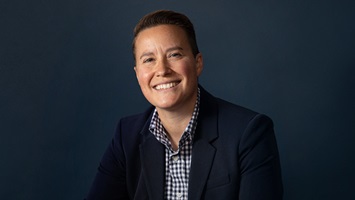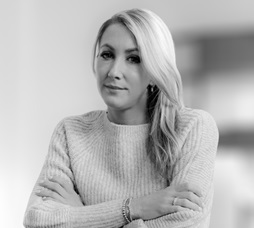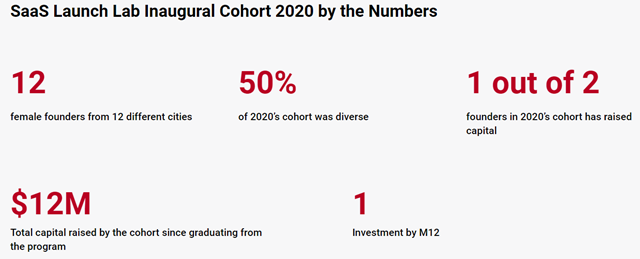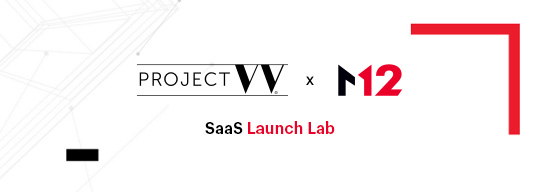In This Issue:
- Putting Substance Behind Hashtags
- Q&A With Jackie Trebilcock
- SaaS Launch Lab
- How Necessity Can Be the Mother of Invention
Putting Substance Behind Hashtags

Vicky Slade is Counsel in Davis Wright Tremaine's Employment Services Group. During this month's Pride celebration, Vicky reflects on the systemic inequity and discrimination that have marginalized the LGBTQ community and communities of color and how now is the time for companies across all industries to put substance behind the hashtags and continue to make change in a meaningful and lasting way.
Pride month is a wonderful time of year. Pre-COVID, it meant loud, colorful parades and sweaty dance parties. During COVID, it meant a more reserved, masked family walk while decked out in rainbow gear. At all times, it has meant joy and celebration of community. I take immense pride in being a member of the LGBTQ community, and I love the annual reminder of how much we have to be grateful for and to celebrate.
It is also important to remember how much work we still have to do, and Pride is as good a time as any to remember that the system that persecuted and marginalized the LGBTQ community for many years—and still does—also continues to do serious harm to other and overlapping marginalized groups.
The year 2020 was groundbreaking in many ways, one of which was the way that the horrific murders of Black men and women at the hands of police brought attention to racial injustice. While the focus of the Black Lives Matter movement has been police violence, 2020 also shed light on systemic inequities in other areas, including the work environment.
Last year's increased focus on racial bias saw conversations around privilege and equity entering the workplace in an entirely new way. Companies across all industries announced support for Black Lives Matter and pledged to make needed improvements in the advancement of people of color within their organizations.
Businesses took a hard look at their practices, attempting to ferret out systemic inequities. Many have invested in trainings that go beyond the floor of preventing unlawful harassment and discrimination and instead aspire to create work environments that are truly inclusive. Some have made bold commitments to concrete advancements in the representation of minorities among their employees and their leadership, while others have found ways to provide better resources and support for their existing minority employees. This groundswell of support for and focus on diversity, equity, and inclusion has been a bright spot and source of inspiration in an otherwise painful and difficult year.
Now we find ourselves just over a year after the murder of George Floyd and on the cusp of returning to a sense of normalcy as COVID numbers decline and people return to the workplace. My hope is that the dramatic surge in interest in diversity, equity, and inclusion work that we witnessed in 2020 is not a passing trend but instead a sustained effort.
Every June when corporate logos turn into rainbows and companies announce their support for LGBTQ employees, the queer community celebrates these messages but also applies a healthy dose of skepticism. Do the same companies whose logos are rainbows provide equitable healthcare benefits to their employees who identify as transgender or non-binary? Do these companies allow people to identify their pronouns in their email signatures or on their nametags? Do these companies create a space that feels safe for an employee to disclose their sexual orientation or show up authentically in terms of gender expression? Does this company take complaints of harassment and discrimination seriously?
Just like corporate support for Pride is meaningless when it lacks action behind it, corporate pledges of support for Black Lives Matter ring hollow when they are at odds with the way the company treats its employees. For the focus on racial equity that we saw in 2020 to be more than just performative allyship, there must continue to be substance behind the hashtags. Companies must remember that supporting employees of color and working to eliminate systemic discrimination is not something you can achieve through a marketing campaign. Working towards racial equity is long-term, difficult work. It takes serious self-reflection, focus, humility, and a willingness to change. I am hopeful that the great work that started over the last several decades but went into turbo-drive in 2020 will continue in full force into the future to create real and lasting change.
Q&A With Jackie Trebilcock

Jackie Trebilcock, Managing Director, New York Fashion Tech Lab (NYFTL)
Jackie Trebilcock has been the Managing Director of the New York Fashion Tech Lab (NYFTL) since it was founded in 2014. The nonprofit program was co-founded by Springboard Enterprises and key fashion retailers to support women-led companies that have developed innovations at the intersection of fashion, retail, and technology. The Lab offers selected companies a unique environment where their cutting-edge technologies are quickly tested and iterated, providing both the Lab companies and the Lab's retail partners an unparalleled opportunity to pilot emerging solutions in live retail environments. We asked Jackie to tell us how the Lab has evolved throughout the years and what advice she has for founders looking to apply to one of the many program offerings (accelerators, incubators, labs and fellowships) now available to startups.
Q: This year, NYFTL announced its eighth cohort of women-led companies. How has the program changed since its inception in 2014?
A: Each year the Lab focuses on a cohort of early to growth stage B2B fashion and retail tech companies. This has not changed although we now have more applicants applying globally and a larger network of retailers and brands to expose them to. This year's Lab companies are comprised of six women-led emerging technology companies that offer market-ready solutions for the industry and beyond. These companies, selected by industry leaders, will participate in the Lab's first fully virtual/digital Lab experience and join the Lab from Canada, Australia, Germany, the United Kingdom, and the United States. Since 2014, the Lab has worked with over 60 emerging tech companies. The full list of Lab companies is available here: https://nyftlab.com/all-labs
Q: The NYFTL has a mission of supporting innovation at the intersection of fashion, retail and technology. The fashion and retail industry has been profoundly impacted by COVID-19. Have you noticed a trend in the types of technologies and solutions the industry is now embracing? Does the Lab's current cohort of companies reflect any of these trends?
A: The pandemic forced many retailers to implement innovative strategies to adapt to a new world. Not surprisingly, our last two cohorts have been very relevant to the shift we are witnessing in consumer needs and retail needs in general. These trends include, contactless commerce, customer personalization, virtual and augmented reality, circular economy, sustainability, video shopping, inclusivity, 3D and NFT's.
Q: Since the inception of the program, what have been some standout moments for you overall?
A: Since the launch of the first Lab in 2014, our goal was to bring new technology resources to fashion retailers and brands in order to move the industry forward. Participating Lab companies are women-led and come from around the world to receive exposure to and collaborate with our network of industry experts who offer business support, facilitate connections and evaluate potential partnerships. Every cohort of the Lab has resulted in standout moments, big and small: from witnessing the development of camaraderie and friendships between our founders to company acquisitions. When I take a step back and consider the countless connections we have facilitated between retailers, investors and our founders, it is truly incredible. We continue to keep in touch with, engage, and support our alumnae and enjoy trying to continue to support them once the program has ended.
Q: Over the past decade, the startup ecosystem has experienced an explosion of growth in the number of programs available to founders. What is your best advice for a founder who is considering applying to an accelerator or incubator?
A: Right now is a great opportunity to take advantage of the expanded accessibility to these types of programs, given many have shifted to a virtual format. However, you should always keep in mind that each accelerator and incubator is specific with respect to both mission and goal. A suggestion that many founders find helpful is to try to connect with the program's alumni and network to gauge whether they also agree it is a fit for you and your company. In addition to ensuring company and program fit, make sure to evaluate if this is the right time for you and your company to take on the level of commitment the program requires. Accelerators and incubators come in all shapes and sizes, and some require a substantial commitment of time that not all founders can afford whether it is because they are in the middle of raising funds, still have a full-time job, or a number of other reasons.
SaaS Launch Lab
We are thrilled to announce that we will be reprising last year's SaaS Launch Lab and will be launching, on June 17th, the application for founders to join our second cohort. With a shared gender equity mission, Project W and M12, Microsoft's venture arm, collaborated for the first time in 2020 to create a program for promising pre-seed, female-led companies developing enterprise SaaS solutions. The multi-week virtual program is designed to help female founders refine their proof of concept, find the right product-market fit, build a team, and raise a seed round. Here is a snapshot of our inaugural cohort:

The stats on the Lab's inaugural cohort highlight our goals for gender and racial equity in the funded founder ecosystem. Those stats also illustrate what happens when early-stage women led SaaS enterprise and deep-tech startups have access to the networks, tools and support necessary to succeed.
The success of our first cohort is apparent not only by the numbers but also in the founder feedback we received and the lasting relationships that were formed. Oksana Sokolovsky, Co-Founder & CEO of ROAR and 2020 Lab alumna shared, 'Unlike some of the other startup programs I have experienced, the SaaS Launch Lab delivered real and tangible value. I was able to walk away with so many useful insights, ideas and relationships, including a connection to an angel syndicate that ultimately invested in my company. I even had the chance to connect with a faculty member who led one of the workshops who took the time for a deeper dive on topics and issues I was facing with my company at that time. It was a real game changer.' In terms of lasting relationships, Project W teamed up with Lab 2020 Alumna Tiffanie Stanard, CEO & Founder of Stimulus, along with partner organization, Black & Brown Founders, on producing a series of events that discuss supply chain issues through the voices of diverse founders. 'The Lab connected me to Project W and I'm happy to report that we are working together on a series of events that has tremendous meaning to me. The Lab was much more than an accelerator program for me. I feel as if I've gained a partner in my corner who is genuinely invested in my success.'
Applications for the 2021 Project W x M12 SaaS Launch Lab open June 17th with a deadline to apply by July 23rd.
How Necessity Can Be the Mother of Invention

By Charlotte Michailidis, Founder & CEO, Parenthood Ventures
Charlotte Michailidis is the founder of Parenthood Ventures, a supportive ecosystem for early stage startups, serving parents and their children from fertility to teens. The organization brings together founders, investors, mentors and parents to help the sector thrive. At a time of acute crisis for families, Charlotte discusses systemic challenges that have historically impeded innovation when it comes to parenthood and how the time is ripe to 'unstick' the sector as a whole.
Much has been written about the drastic impact of COVID-19 on young families: the fear of pandemic pregnancy, delays to fertility treatments, months juggling work with virtual schooling or cancelled childcare, and mental health crises among teens.
With the primary efforts of childrearing continuing to fall on the shoulders of 'mom,' we saw 493,000 more women than men dropping out of the U.S. labor force since the pandemic began. But while the coronavirus proved a tipping point, parents in dual career or single-parent households have long been living at the brink, given singularly poor family leave protections in the U.S. combined with the work-life expectations of American employers and cultural norms around caregiving and gender.
While the pandemic exacerbated the challenges of parenting, the pain points are not new.
The failure of tech for parents
We live in an increasingly digitally enabled world. One of the primary advantages of technology is scale: where once we might individually seek out information, products or services, now millions of us can simultaneously tap into resources at our fingertips, from anywhere at any time of day. There is a 'tech' solution for almost every imaginable customer pain point – except parenting.
Disruptive technologies have spurred breakthroughs and innovations across almost all industries and yet we see a stubborn dearth of high-quality tech-enabled solutions for parents. In a world increasingly conscious of the importance of mental health, wellness, nutrition, and early childhood education and development, families going through one of the most broadly shared human experiences - having and raising children - are woefully underserved.
Entrepreneurs and investors are always looking for the next opportunity: pain points to be addressed, big problems to solve, and new ways of doing things. Which raises the question: what is preventing founders from seizing the opportunity to fix pain points that have been so broadly experienced for millennia and what is preventing investors from investing in those opportunities?
As in any sector or industry, the founders best placed to build and scale a new generation of solutions are individuals living the problems they seek to solve. Definitionally, the strongest founders of ParentTech startups should be parents with young families, and in many cases female. However, for parents and, especially, mothers, daily schedules and financial responsibilities are radically different from a 20-something tech bro, especially during the current pandemic-induced caregiving crisis. This means that the founders who understand the pain points and are in the best position to develop solutions have the least amount of time and resources to devote to the risky proposition of innovating.
Additionally, investors have yet to recognize the huge investment opportunity in parenting solutions given the size of the market and the enormous unmet need. While investor demographics are changing, the reality on the ground is that the vast majority of VCs are 40+, white and male and they are often biased against considering deals in historically "female" sectors.
How, then, can we expect to see high quality, affordable tech for parents?
Millennial moms step up to the plate
I wrote a post recently in an online moms' group for graduates of an Ivy League MBA program. My intent was non-specific, to update some like-minded parents of my work in supporting early stage ParentTech and ascertain if anyone might be interested in connecting with founders in our community.
The result was astonishing. More than 10% of the group's population responded with written messages of interest. I set up coffee with each of them (it's been a busy few weeks!) to explore ways they might engage and be included in our initiative. The common thread across my meetings was this: Millennial working moms are tired of the way things are. They are acutely aware of how much easier things could be. And they are intensely motivated to support the cause - whether offering feedback on founders' concepts, providing mentorship, or helping them raise capital.
This is why at Parenthood Ventures we are building a community of founders, investors, mentors and parents around the common cause of finding solutions to ease the pain points and embrace the joys of parenthood. To the exhausted parents reading this: Know that we see you. That you are not alone in your exhaustion. That there is light glimmering behind these clouds. And that you are welcome to join us.
Learn more about Parenthood Ventures here.

